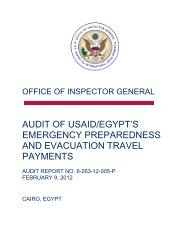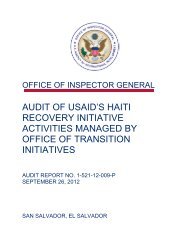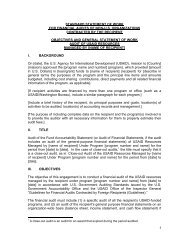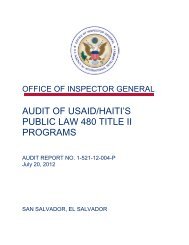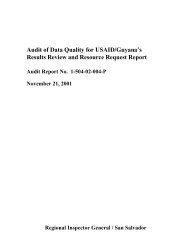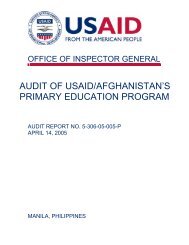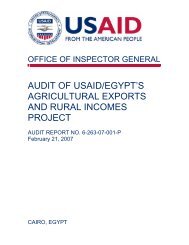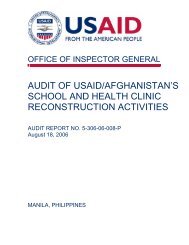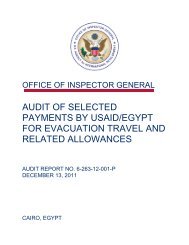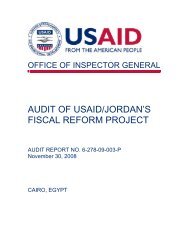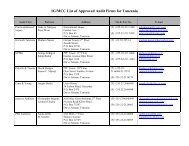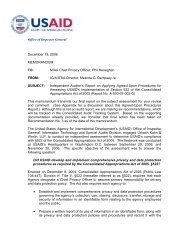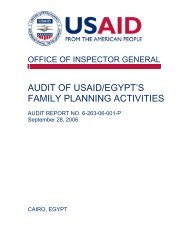USAID OIG Afghanistan and Pakistan Oversight Report, April-June ...
USAID OIG Afghanistan and Pakistan Oversight Report, April-June ...
USAID OIG Afghanistan and Pakistan Oversight Report, April-June ...
- No tags were found...
You also want an ePaper? Increase the reach of your titles
YUMPU automatically turns print PDFs into web optimized ePapers that Google loves.
staff from traveling into the field, <strong>and</strong> to maintain a low profile, local staff members were using unarmoredvehicles. In addition, vehicle leasing costs were unreasonably high.The long-term benefits of the initiative were also undercut by a lack of planning. Although some keydistricts were ready for longer-term development projects, no comprehensive plans were in place to guidethis transition. Without a comprehensive transition plan to prepare for longer-term development, keydistricts may not be able to sustain gains in stability, as district governors may not have the resources tomeet the needs of their communities.Financial controls were also problematic. For example, Chemonics used cash to make large tax payments tothe Afghan Government, increasing the risk that a payment could be stolen. In May 2011, an employee sentto a bank in Lashkar Gah with $62,398 to pay taxes to the Ministry of Finance disappeared with the money.Although most of the money was ultimately recovered, this incident exposed weaknesses in Chemonics’internal controls.Audit of <strong>USAID</strong>/<strong>Afghanistan</strong>’s On-Budget Funding Assistance to the Ministry of Public Health inSupport of the Partnership Contracts for Health Services Program (<strong>Report</strong> No. F-306-11-004-P,September 29, 2011)In 2008, <strong>USAID</strong> signed an implementation letter with the Government of the Islamic Republic of <strong>Afghanistan</strong>to provide the mission’s first core-budget funding assistance to the Ministry of Public Health (MoPH) insupport of the Partnership Contracts for Health Services Program. Under this program, the mission plannedto provide MoPH with up to $236 million in budget assistance over 5 years to support the delivery ofst<strong>and</strong>ardized health services in more than a dozen target provinces. In 2009, MoPH awarded $80 million incontracts to ten NGOs. These NGOs were responsible for providing st<strong>and</strong>ardized health services in morethan 500 health facilities <strong>and</strong> 5,500 health posts throughout the target provinces.<strong>OIG</strong>’s audit found that sustainability of the program was a concern. The government’s extremely lowcontribution to health care raises questions about the long-term viability of health services. With shrinkingdonor support in the foreseeable future, the Afghan Government’s ability to increase health-care coverage to90 percent of the population appears unlikely, while its ability to sustain the current level of coverageremains uncertain. Unless the Afghan Government is able to generate sufficient revenue to cover its healthcarecosts, the health sector’s dependency on donor support will continue.Although the program has contributed to increasing access to <strong>and</strong> use of health services, <strong>OIG</strong> noteddeficiencies in quality at all health facilities visited. Doctors <strong>and</strong> staff at several facilities complained that thevolume of patients was up to double their capacity to h<strong>and</strong>le. Patients sometimes waited up to 5 hoursbefore receiving medical services, <strong>and</strong> others went home without receiving treatment. Some of the healthfacilities had old equipment that needed repair or replacement. One health facility had a newly donatedanesthesia machine, but the responsible NGO ignored repeated staff requests for training on the equipment.Several of the buildings were in poor condition, requiring repairs, renovation, <strong>and</strong> painting.Program management also needs to be tightened. Confusion over who responds to MoPH’s technicalinquiries has led to delayed responses or inadequate feedback from <strong>USAID</strong>. In addition, the mission haslimited experience in managing on-budget assistance activities. In fact, when trying to resolve the problemof consistently late payments to the NGOs, Ministry <strong>and</strong> <strong>USAID</strong> staff had difficulty explaining the lengthy <strong>and</strong><strong>USAID</strong> <strong>OIG</strong> <strong>Afghanistan</strong> <strong>and</strong> <strong>Pakistan</strong> <strong>Oversight</strong> <strong>Report</strong> 71



